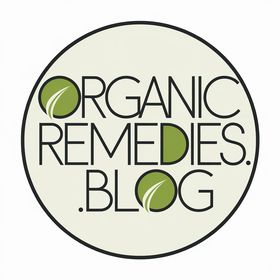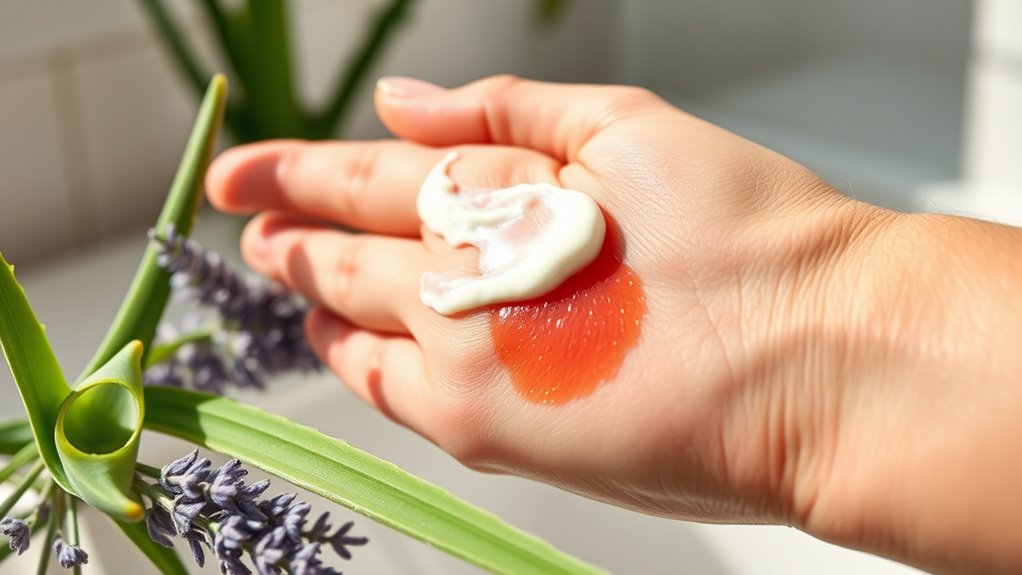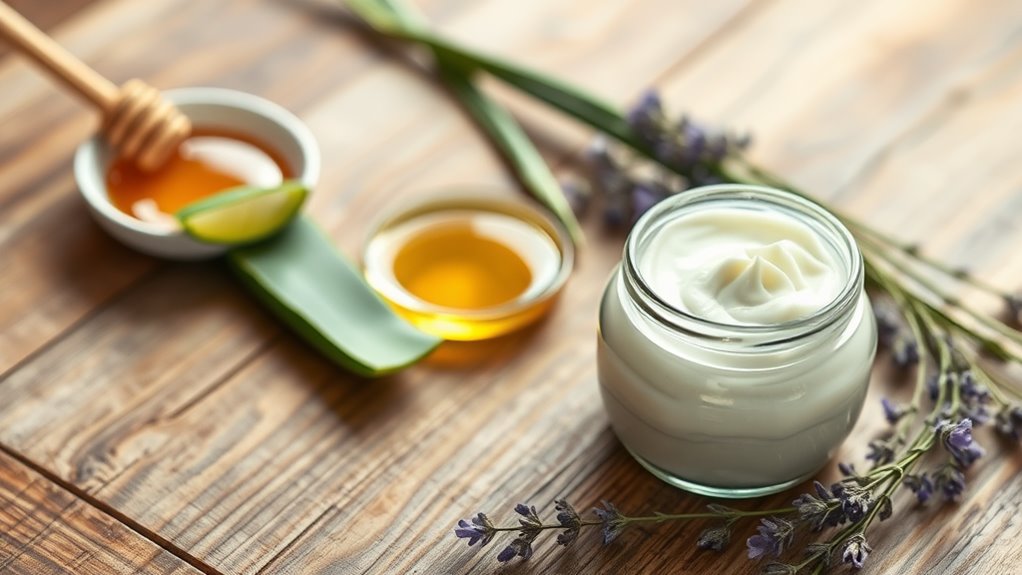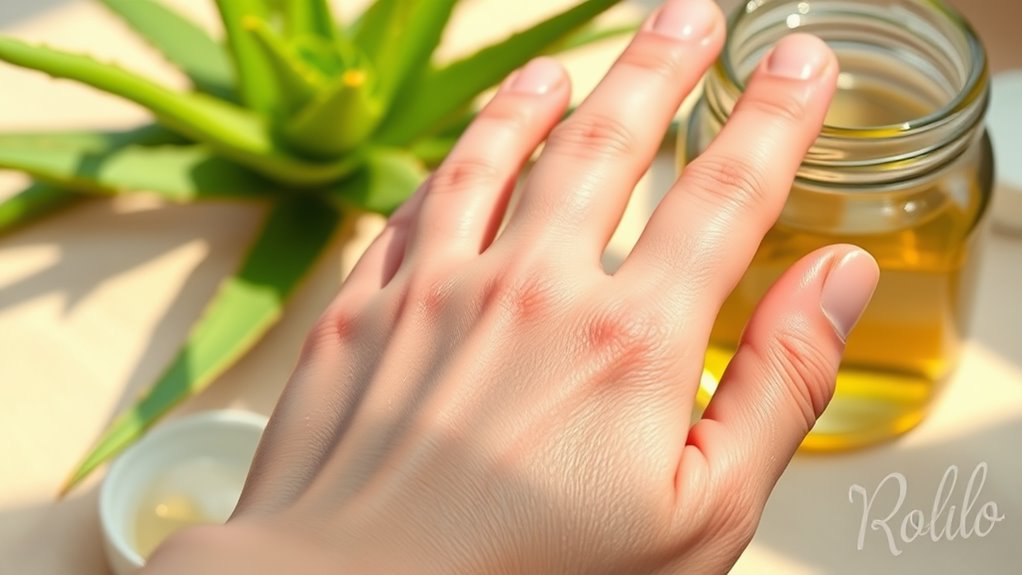Soothe Eczema Flare-Ups With This Natural Cream
Many people overlook the importance of a strong skin barrier in managing eczema flare-ups. This barrier is crucial for protecting your skin from irritants and maintaining hydration. By using a natural cream made from specific soothing ingredients, you can effectively reduce inflammation and itching. Understanding the key components and how to apply them can significantly enhance your skin’s health. Let’s explore how you can create and use this remedy for better relief.
Key Takeaways
- Create a homemade eczema cream using coconut oil, shea butter, and beeswax for deep hydration and barrier protection.
- Incorporate colloidal oatmeal to restore the skin barrier and reduce itching during flare-ups.
- Apply the cream immediately after bathing to lock in moisture and enhance effectiveness.
- Use gentle upward strokes when applying to minimize irritation on sensitive skin.
- Consider adding essential oils like lavender for calming effects and additional itch relief.
Understanding Eczema and Its Triggers
What causes eczema flare-ups? Eczema triggers vary, including environmental factors like allergens, irritants, and extreme weather. Stress and hormonal changes can also exacerbate symptoms.
If you’ve got sensitive skin, certain fabrics or soaps might irritate your condition.
An effective eczema home remedy often involves identifying and avoiding these triggers while maintaining skin hydration.
Regularly moisturizing can help create a barrier against irritants.
Additionally, some people find relief from natural ingredients that support skin health. Natural ingredients like aloe vera and coconut oil may provide soothing effects and promote healing.
Understanding your specific triggers is crucial for managing eczema and preventing flare-ups, allowing you to choose the right home remedies for your skin’s needs.
Key Ingredients for Natural Relief
Natural remedies for eczema often hinge on specific ingredients known for their soothing and healing properties.
Look for creams containing colloidal oatmeal, which helps restore the skin barrier and reduces itching. Shea butter is another key ingredient; it moisturizes deeply and has anti-inflammatory effects.
Coconut oil offers antimicrobial benefits that can prevent infections, while calendula extract promotes healing and reduces redness.
You might also consider products with aloe vera, known for its cooling properties. Additionally, incorporating lifestyle changes such as a balanced diet and stress management can enhance the effectiveness of these natural remedies.
These ingredients work synergistically to alleviate symptoms and support skin health, making them effective options for managing your eczema flare-ups naturally.
How to Make Your Own Eczema Cream
Have you ever considered making your own eczema cream at home?
Creating a natural remedy can be straightforward and effective.
Here’s a simple recipe using common ingredients:
- Coconut oil: Acts as a moisturizer and has anti-inflammatory properties.
- Shea butter: Provides deep hydration and soothes irritation.
- Beeswax: Creates a protective barrier to lock in moisture.
- Essential oils (like lavender): Offers calming effects and can reduce itching.
Melt the beeswax and oils together, mix in shea butter, and stir until combined.
Allow it to cool, and your homemade eczema cream is ready for use!
Incorporating natural ingredients can enhance the effectiveness of your remedy.
Application Techniques for Best Results
How can you ensure your homemade eczema cream is most effective? Start by applying it immediately after bathing to lock in moisture. Use gentle, upward strokes to minimize irritation. A thin layer is sufficient; excess can clog pores. Additionally, incorporating chemical-free ingredients in your cream can enhance its soothing properties.
| Timing | Technique |
|---|---|
| After Bathing | Upward Strokes |
| Twice Daily | Thin Layer |
| During Flare-Ups | Focus on Affected Areas |
Complementary Lifestyle Changes
To manage eczema effectively, consider incorporating dietary modifications and stress management techniques into your routine.
Research shows that certain foods can trigger flare-ups, while a balanced diet may help reduce inflammation. Additionally, implementing stress reduction strategies can significantly improve your overall skin health and emotional well-being. Furthermore, adopting a strategic morning routine may enhance your hormonal balance, which can play a role in skin health.
Diet Modifications
Diet modifications can play a crucial role in managing eczema symptoms and promoting overall skin health.
By adjusting your diet, you can reduce inflammation and improve your skin’s barrier function. Consider these dietary changes:
- Increase omega-3 fatty acids: Found in fish, flaxseeds, and walnuts, they may help reduce inflammation.
- Limit dairy and gluten: Some individuals find these trigger flare-ups.
- Incorporate antioxidants: Foods rich in vitamins C and E can support skin repair.
- Stay hydrated: Drinking enough water helps maintain skin moisture.
These modifications can complement your eczema treatment, leading to better management of your condition.
Stress Management Techniques
Managing stress effectively can significantly impact your eczema symptoms and overall skin health.
Research shows that stress triggers inflammatory responses, exacerbating flare-ups.
To manage stress, consider techniques like mindfulness meditation, which reduces anxiety and improves emotional regulation.
Regular physical activity, such as yoga or walking, can also lower cortisol levels and enhance mood.
Deep breathing exercises help calm the nervous system, promoting relaxation.
Additionally, maintaining a consistent sleep schedule is crucial, as sleep deprivation can worsen stress and skin conditions.
When to Seek Professional Help
When should you consider seeking professional help for eczema?
If your symptoms worsen or don’t improve with home treatments, it’s essential to consult a healthcare provider.
Additionally, consider professional guidance in the following situations:
- You experience severe itching that disrupts sleep or daily activities.
- Your skin shows signs of infection, such as increased redness, swelling, or discharge.
- You notice widespread or persistent rashes that don’t respond to over-the-counter creams.
- You’re considering starting new prescription medications or therapies.
Timely intervention can prevent complications and help you manage your eczema more effectively. In some cases, a healthcare provider may recommend evidence-based remedies to better alleviate your symptoms.
Don’t hesitate to reach out for support.





